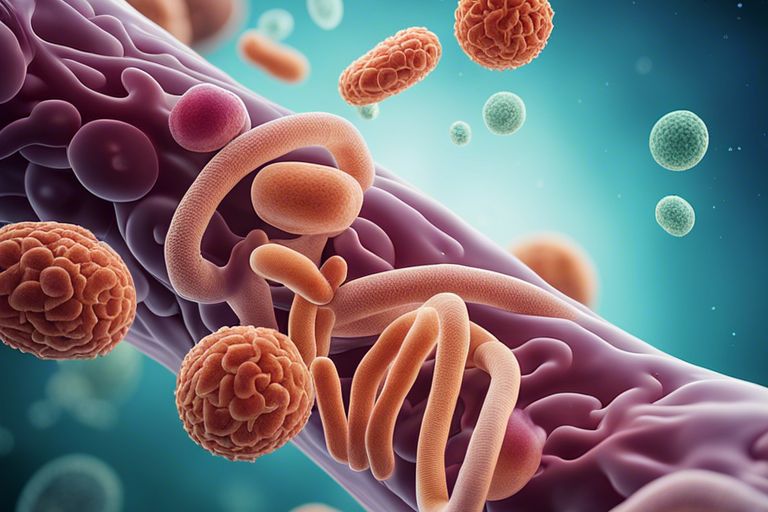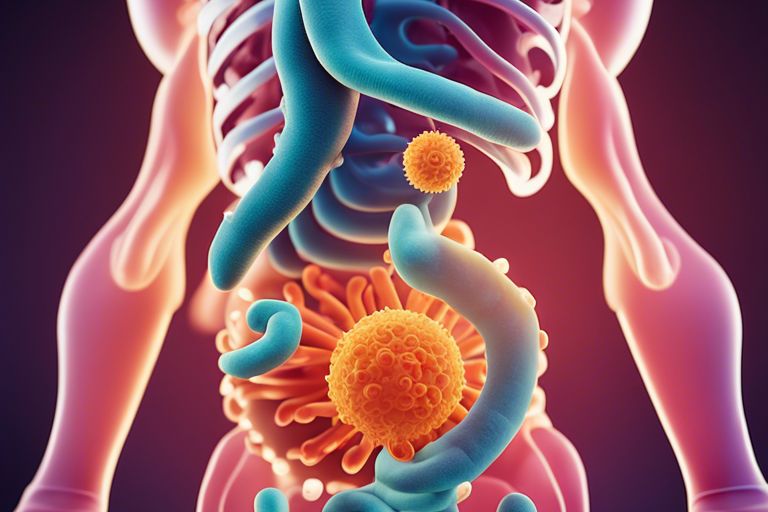
There’s no denying the importance of maintaining a healthy gut, as it plays a crucial role in our overall well-being. However, parasites lurking in our digestive system can pose a serious threat to our health without us even realizing it. This hidden danger can lead to a range of issues, from digestive discomfort to nutrient deficiencies and even chronic illnesses. Understanding the role of parasite cleansing in maintaining digestive balance is important for taking control of our gut health and overall wellness.
In need of the leading 3 herbs to get rid of parasites? Click Here
Did you know parasite eggs can live in your intestines for weeks and months BEFORE hatching, and some adult worms can live in the intestine for 1-2 years as adults? Click HERE to get your parasite cleanse today: https://love.embracepangaea.com/shop/p/parafree-parasite-worm-herbal-detox-made-with-pau-darco-goldenseal

Key Takeaways:
- Parasite Cleansing Is Essential: Performing regular parasite cleansing can help maintain digestive balance by eliminating harmful parasites from the gut.
- Improved Digestive Health: By removing parasites, you can improve your overall gut health, which can lead to better nutrient absorption, reduced inflammation, and a stronger immune system.
- Consult a Healthcare Professional: Before starting any parasite cleansing regimen, it is crucial to consult with a healthcare professional to ensure it is safe and appropriate for your individual health needs.
1. Parasites can disrupt gut health and digestive balance. 2. Symptoms include bloating, fatigue, and digestive issues. 3. Cleansing can help eliminate parasites and restore balance. 4. Natural treatments like herbs and dietary changes may help. 5. Consult with a healthcare provider before starting a cleanse. 6. Maintain gut health with probiotics and a balanced diet.
Understanding the Risks
Factors That Compromise Gut Health
One of the key factors that compromise gut health is a diet high in processed foods and sugar. This can disrupt the balance of good and bad bacteria in the gut, creating an environment where parasites can thrive. Other factors such as chronic stress, lack of sleep, and exposure to environmental toxins can also weaken the immune system and make the gut more vulnerable to parasitic infections. This highlights the importance of maintaining a healthy lifestyle to support overall digestive well-being.
- Diet high in processed foods and sugar
- Chronic stress
- Lack of sleep
- Exposure to environmental toxins
This emphasizes the need to address these risk factors to promote a balanced gut environment and reduce the likelihood of parasitic infections.
Identifying Symptoms of Parasitic Infections
Identifying the symptoms of parasitic infections can be challenging as they often mimic other common digestive issues. Symptoms such as persistent bloating, diarrhea, fatigue, weight loss, and unexplained itching can indicate the presence of parasites in the gut. For instance, certain parasites like Giardia and tapeworms can cause severe gastrointestinal symptoms and should be treated promptly. If you experience any of these symptoms, it is important to consult with a healthcare professional for proper evaluation and testing.
Want the best top best 3 herbs to get rid of parasites? Click Here
The Science of Parasite Cleansing
What Is Parasite Cleansing?
Now, let’s examine the world of parasite cleansing. Parasite cleansing is a natural therapy that aims to eliminate harmful parasites from the body. These parasites can disrupt the delicate balance of your gut microbiome, leading to digestive issues, nutrient deficiencies, and other health problems.
How Parasite Cleansing Works to Restore Balance
What exactly does parasite cleansing entail? Parasite cleansing typically involves the use of herbs, dietary changes, and supplements to help your body effectively eliminate parasites. These natural ingredients can target and eliminate parasites living in your digestive system, allowing your gut to heal and restore its natural balance.
Implementing a Parasite Cleanse
Preparation for a Parasite Cleanse
Once again, it is important to prepare your body before starting a parasite cleanse. This can involve gradually eliminating certain foods from your diet, such as processed foods, sugars, and dairy, to create an environment that is less hospitable to parasites.
Diet and Lifestyle Changes During Cleansing
On your journey to cleanse your body of parasites, it is crucial to make some dietary and lifestyle changes. Reducing sugar intake, increasing fiber-rich foods, and staying hydrated can help support the cleansing process. Incorporating probiotic-rich foods like yogurt and fermented vegetables can also aid in restoring balance to your gut flora.
Parasite cleansing may also involve avoiding alcohol and caffeine, getting adequate sleep, and reducing stress levels. These changes can create an environment that is challenging for parasites to thrive in, ultimately supporting the effectiveness of the cleanse.
Maintaining Digestive Health Post-Cleanse
Diet and Probiotics for Long-Term Gut Health
Probiotics play a crucial role in maintaining a healthy gut after completing a parasite cleanse. Incorporating probiotic-rich foods such as yogurt, kefir, sauerkraut, and kimchi into your diet can help replenish the beneficial bacteria in your digestive system. These good bacteria support digestion, boost immunity, and reduce inflammation, promoting long-term gut health. Balancing your diet with fiber-rich foods like fruits, vegetables, and whole grains can also ensure a well-functioning digestive system.
Monitoring Your Digestive System After Cleansing
Digestive health should remain a top priority even after completing a parasite cleanse. Your gut may still be sensitive following the cleanse, so paying attention to any changes in your bowel movements, bloating, or digestive discomfort is crucial. If you notice any persistent symptoms like diarrhea, constipation, or abdominal pain, it’s important to consult with a healthcare provider to address any underlying issues and ensure your gut is functioning optimally.
Final Words
On the whole, maintaining gut health is crucial for overall well-being. The role of parasite cleansing in achieving digestive balance cannot be underestimated. By being proactive and incorporating parasite cleansing into your wellness routine, you can support your gut health and prevent potential imbalances. Listen to your body, prioritize good nutrition, stay hydrated, and consider incorporating natural parasite cleansing methods for a healthier digestive system. Your gut health is in your hands, so take charge and take care of your body from the inside out.
FAQ
Q: What is gut health and why is it important?
A: Gut health refers to the balance of microorganisms that live in the digestive tract. It is important because these microorganisms play a crucial role in digestion, immune function, and overall health.
Q: What are parasites and how do they impact gut health?
A: Parasites are organisms that live in or on another organism and benefit at the host’s expense. When present in the gut, parasites can disrupt the balance of gut microorganisms and lead to digestive issues.
Q: How can parasite cleansing help maintain digestive balance?
A: Parasite cleansing involves using natural remedies or medications to eliminate parasites from the body. By getting rid of parasites, the balance of gut microorganisms can be restored, promoting better digestive health.
Q: What are the signs that indicate your gut health may be at risk due to parasites?
A: Symptoms of poor gut health due to parasites may include bloating, gas, diarrhea, constipation, fatigue, and unexplained weight loss. It’s important to consult a healthcare provider for proper diagnosis and treatment.
Q: How can I support gut health after parasite cleansing?
A: To support gut health after parasite cleansing, focus on eating a balanced diet rich in fiber, probiotics, and prebiotics. Stay hydrated, manage stress levels, and maintain good hygiene practices to prevent reinfection.